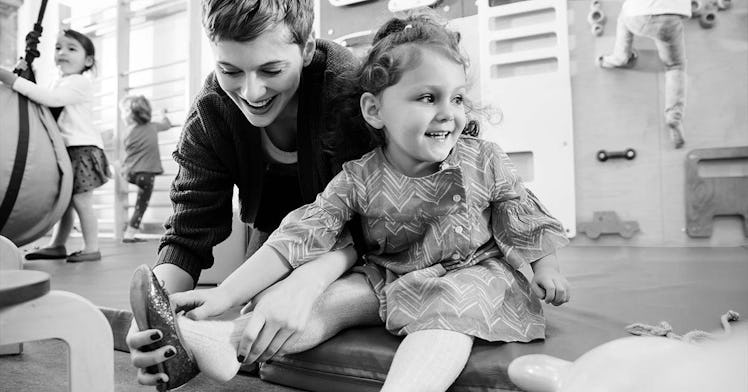New Study Proves Urgency of the Biden Universal Pre-K Plan
It's less about test scores and everything about long-term benefits.

Experts have long said that three-and four-year-olds enrolled in early school programs, like universal-prekindergarten, fair better in the long term. And while that’s great, in the United States, the cost of attending pre-kindergarten can be high, the waitlists long, and sometimes only accessible to parents who can afford it.
That’s why Biden’s universal pre-kindergarten plan, which would extend universal, free pre-k to all children ages 3 and 4, is so massive: it’s another two years of free schooling for kids. And a new study proves just how urgent putting the plan into action is — not just for parent’s wallets, but also for their kid’s brains.
Here’s The Background on the Study
In the 1990s, Boston expanded their publicly funded pre-K program, making it possible for more people to access the program. However, there weren’t enough spots for every 4-year-old eligible to enroll, so a lottery system was put in place to determine, at random, which kids could attend the publicly funded preschool programs.
And the Boston pre-K data, full of 20 years of random chance information, was studied, analyzed, and subsequently just by three economists from the University of California, Berkley, the University of Chicago, and the Massachusetts Institute of Technology. The data removes any doubt that universal pre-K for kids 3-4 years old is vital.
The study, which was released May 10, 2021, was consistent with other pre-k findings. It found that kids in Boston who won the pre-K lottery didn’t score better on standardized tests through elementary school, middle school, or high school. In fact, was no evidence that there was an educational advantage for kids who attended pre-K to those who didn’t. But the well-being of, and overall life achievement of, was profoundly different for kids who got in.
But The Findings Show Universal Pre-K Is Massively Important For Kids
Kids who attended publicly funded pre-K were “less likely to be suspended in high school and less likely to be sentenced to juvenile incarceration,” the New York Times reports. “Nearly 70 percent of lottery winners graduated from high school, compared with 64 percent of lottery losers, which is a substantial difference for two otherwise similar groups. The winners were also more likely to take the S.A.T., to enroll in college and — though the evidence is incomplete, because of the students’ age — to graduate from college.”
According to the researchers, the positive effects of pre-K were similar across all genders. However, they were more impactful for boys than girls. The effects were the same across all racial groups and income groups.
“An important implication of our study is that modern large-scale public preschool programs can improve educational attainment,” Christopher Walters, a Berkeley economist, said to The New York Times.
And It Just Backs Up Other Data About Child Care
The Boston study is not the only study to show the long-term effects of high-quality pre-K. In 1972 the UNC Frank Porter Graham Child Development Institute created the Abecedarian Project, a controlled longitudinal study that continues to this day. The Abecedarian Project began in participants’ early infancy and exposed children to high-quality child care and education setting for five years prior to school entry.
It’s Not Just About Grades
The results in the over-30 years of follow-up studies have found participants exposed to the care and education continue to thrive.
“The study determined that people who received early care with the Abecedarian program have lower rates of pre-hypertension in their mid-30s than those in the control group,” the researcher noted in the 2014 follow-up. “They also have a significantly lower risk of experiencing total coronary heart disease (CHD)—defined as both stable and unstable angina, myocardial infarction, or CHD death—within the next 10 years.”
So Will We Get Universal, Free Pre-K?
Right now, the Biden administration is pushing to make pre-K universally available in every state. Not only would this unlock long-term socioeconomic, health, and mental benefits for kids, but access to pre-K has big benefits for parents as well.
Universal pre-K would unlock the ability for parents to re-enter the workforce without worrying that the cost of the education would be more than their paycheck brings home, which is a big reality for many parents. (One study found a nearly immediate 11 percent jump in workforce participation among moms in D.C. after universal pre-k was instated in the city.)
For kids, universal-pre-k closes some achievement gaps, but is, more importantly, a means to a better, healthier future. For parents, universal pre-k helps parents re-enter the workforce in great, observable numbers. The policy is a no-brainer — so hopefully, we get it soon.